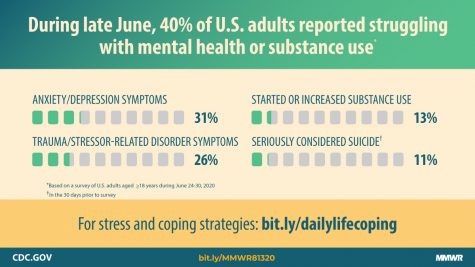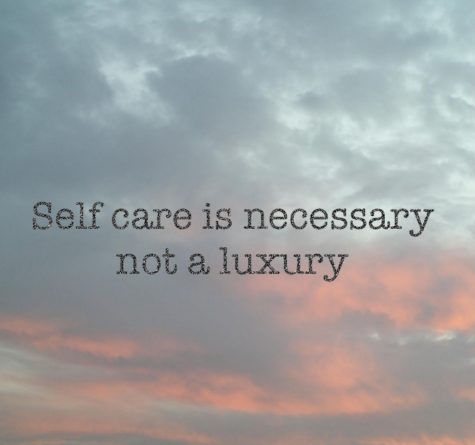Making Mental Health A Priority in 2021
February 11, 2021
Losing weight, getting organized, saving more, spending less and quitting smoking are the most common New Year’s resolutions. Making mental health a priority in 2021 deserves full attention and dedication.
Mental Health America (MHA), a community-based nonprofit dedicated to removing the stigmatism of mental health while addressing the needs of those living with mental illness, demonstrated mental health deterioration has skyrocketed during 2020.
MHA reported that, “From January to September 2020, 315,220 people took to a screen, 93 percent increasing over the 2019 total number of ‘anxiety screens’. 534,784 people with depression went into quarantine, 62 percent increase over the 2019 total number of depression screens.”
Reasonably, COVID was a cause of a sharp decline of mental health, some lost their jobs, others were put at risk of losing their jobs and everyone was sent to their homes for what felt like never-ending solitary confinement. While COVID definitely contributed to an uproar of mental illness cases, there are many variables to why a person can be stressed, depressed, or anxious.

One of the most impactful variables is undoubtedly how many hours of sleep is retained each night. National Sleep Foundation guidelines advise that, “ in order to be healthy, adults need between 7 and 9 hours of sleep per night. Babies, young children, and teens need even more sleep to enable their growth and development.”
Not sleeping can be very harmful not only physically but mentally as well. Elizabeth Orozco, Hart District School Social Worker stated, “Sleep plays an important role in an individual’s physical and mental health. If someone is not getting enough sleep, your brain can ‘fog,’ and ultimately affect someone’s ability to concentrate and make decisions. Lack of sleep can also leave someone feeling tired, and can skew their ability to regulate their emotions, and can increase their risk of developing a mental health condition.”
Getting the recommended hours of sleep is a start to making a habit out of prioritizing mental well-being. It forces your brain to shut down regularly by getting some well needed rest and relaxation. In turn, reducing the amount of hours the brain has to concentrate on inconsequential thoughts or stressful thoughts.
In order to perfect anything it needs to be practiced. Psychological health is no different. Everyday needs to be consistent, no matter how big or small the act is. Whether it be coloring, taking a walk, painting, reading a book or even just ranting to a friend to get something off your chest.
Mrs. Paniagua, a Spanish teacher at Saugus High School, stated that the way she winds down is walking her dog and listening to a podcast or watching “The Office” reruns. The brain needs to rely on relaxation and self care.

Just as a scraped knee would be treated by a clean up and a bandaid, the same aid needs to be taken with mentality. Orozco reminded, “We often focus on our physical health, however, staying mentally well should be given the same priority. […] it will allow an individual to develop or to sharpen their skills in order to navigate those uncertainties related to the stress of daily responsibilities, a sudden life change or trauma.”
Likewise Mrs. Paniagua suggests “make mental health and self care feel normal. It used to NOT be. It is moving toward something that we all struggle with at some point in our lives. It doesn’t matter if we are celebrities, normal people, rich, not rich. It’s the great equalizer.”
The world can be a very stressful place and school or work doesn’t exactly help manage stress. Some advice from Orozco: “Always try to stay as organized as possible. Write stuff down on a planner or a calendar app. Plan your assignments and give yourself due dates of when things are due. Secondly, work on setting up individual routines or family routines.”
She continued, “This will help out many students that constantly feel anxious because they feel overwhelmed with the amount of classwork, homework or other day to day activities they might have going on. Thirdly, communicate with your teachers if you feel like you are struggling. Teachers, counselors, school social workers are here to help and provide students and families with the tools they might need to navigate difficult and stressful situations. ”
School can feel overwhelming. It is okay to not perform at 100 percent all the time, sometimes it is impossible. Take a break when needed to relax a bit, return feeling reenergized and motivated.
It is important to realize when a break is necessary now more than ever it is difficult to recognize the signs of a student or friend struggling emotionally. Mrs.Paniagua concluded, “I would normally [recognize a struggling student] because I get to know my students pretty well, but with distance learning, admittedly I don’t know them much at all. Except, for the few who have confided in me. It’s hard to “notice” 1×1 inch thumbnails of faces who are struggling when that’s the only thing I see and don’t know any different.”
Due to social distancing it is easier to blend in making those who are struggling harder to connect with, but not impossible. Remembering to reach out to talk to anyone who can be confided in is dire.
Orozco mentioned “If you feel like you need to take a mental health day and you are feeling overwhelmed, or there are things happening at home or school, please speak up. We cannot help you if we do not know what is going on. Your teacher, school counselor, administrator or school social worker can help connect you with mental health services or other resources that you might need. ”
Compatably, Mrs.Paniagua said if you need a mental health day, “do it and don’t think twice. Just communicate with your teacher.”
In today’s day and age it is easy to get caught up in a rut but remember to consistently practice self care. Love yourself enough to want to see yourself prosper. Little things add up so wash the slate clean now and then.
Orozco urges students to ,“stay strong and continue to be resilient. Times are hard, and only time will tell when things get better. However, enjoy your life, ask for help. Asking for help can be a hard thing, but when you do, you will learn and be connected with other people that want to support you. Surround yourself with a strong support system and always have at least 1 to 2 people that you can always call.”


Michelle • Feb 11, 2021 at 5:41 pm
Another wonderful article! I especially like the part that talks about the similarity between physical and mental health. I wish more people realized that mental health can be just as real, as painful, and as treatable as physical health problems. You’re not alone and there is help available, please reach out. ❤️